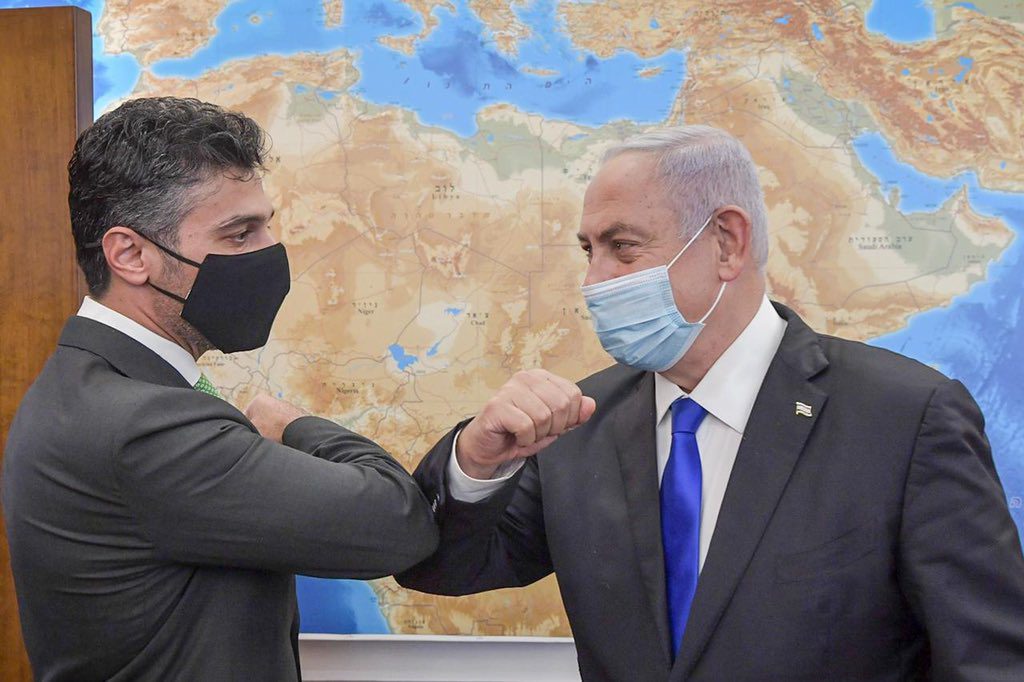
By: Mat Nashed
The UAE appointed Mohamed Mahmoud Al Khaja as its first ambassador to Israel since the two countries inked the Abraham Accords to establish formal relations on September 15, 2020. Al Khaja, 40, resembles how the UAE likes to portray itself: young, chic, and modern.
Born and raised in Abu Dhabi, the father of four holds a degree in Political Science from Northeastern University in Boston and an MBA in Energy Management from Vienna University of Economics and Business.
In 2010, he was appointed as the Chief of Staff to the Minister of Foreign Affairs and International Co-operation. The state-sponsored UAE daily, The National, reports that Al Khaja held a number of key positions in the ministry. He was a member of the political affairs council and the diplomatic committee, and a chairman of the budget committee.
His background in foreign affairs and economics will serve Israel well, which is part of the East Mediterranean Gas Pipeline forum. That project is designed to transport natural gas from a cohort of countries in the Middle East to European states. As a huge importer of natural gas, the UAE joined the forum as an observer in hopes of benefitting from the multi-lateral alliance.
However, Al Khaja’s real value is in his ability to advance the UAE’s well-oiled propaganda machine. He’s already putting a positive spin on the Emirates controversial decision to normalize ties with Israel.
“Honored to receive 22k followers in 48 hours. This tells a powerful message of normalization between the UAE and Israel,” he tweeted. “We need more dialogue, more learning, and more engagement. We are building a warm peace. Thank you for this welcome to Twitter. Shabbat Shalom.”
Public opinion in the Arab world mostly objects to formalizing relations with Israel until a just solution to the Palestinian conflict is found. But Abu Dhabi and Tel Aviv are trying to mitigate criticism through their respective ambassadors.
Al Khaja’s counterpart, Eitan Na’eh, recently told the Khaleej Times that Israelis in the UAE will celebrate the Jewish new year for fruit trees, “Tu Bishvat.” The Emir of Dubai, Sheikh Mohammed bin Rashid, also stressed that Al Khaja’s mission is to enhance the UAE’s new friendship with Israel in a way that promotes “peace, coexistence and tolerance.”
Religious tolerance is a primary theme in UAE and Israeli soft power activities. More broadly, the two nations tout themselves as rare beacons of progress in a backward region. The Jerusalem Post even describes the UAE and Israel as being “anchors of stability in the volatile Middle East.”
Not everyone agrees. Israel and its new Gulf allies continue to push Palestinians into submission, while UAE meddling exacerbates conflict and grievances in Libya and Yemen.
Less debatable is that trade and tourism will sharply rise once the pandemic passes and global travel resumes to full capacity. The Jerusalem Post praised Al Khaja’s business background in hopes that he can strengthen Israeli partnerships with innovators in the UAE.
That appears to be one of Al Khaja’s core missions. One of the very first initiatives that he shared on twitter was an academic partnership between Mohamad bin Zayed University of Artificial Intelligence and the Weizmann Institute of Science. The cooperation aims to promote joint research, training, conferences, and student exchanges.
If UAE diplomacy has proven anything, it’s that a tiny nation can have an outsized influence on global affairs. Yousef Al Otaiba, the UAE ambassador in the U.S, is a case in point. He has formed strong bonds with rival administrations in the Whitehouse, while bankrolling most major think tanks in Washington. His sole purpose is to help shape America’s view on the Middle East. The UAE is counting on Al Khaja to have a similar influence on Israel.
“Mohamed will be a great champion of the Abraham Accords – of people-to-people exchange, of trade and investment, of regional peace and stability,” Al Otaiba tweeted.
Former officials from the Trump administration, which mediated the Abraham Accords, have welcomed Al Khajah’s appointment as a vindication of what they believe is their crowning achievement in the Middle East.
“It’s hard to express the joy this gives to me and the team – led by President Trump and Jared Kushner – that worked on the Abraham Accords. Thank you to the UAE for leading the way,”tweeted Avi Berkowitz, a former assistant to Trump.
Al Khaja landed in Israel for his first visit on March 1, 2021. He submitted his credentials to President Reuven Rivlin and met Prime Minister Benjamin Netanyahu. The visit comes at a time when the International Criminal Court (ICC) contemplates how to investigate war crimes in the occupied Palestinian territories. Israel has blasted the ICC, claiming that the court does not have jurisdiction. Prime Minister Bibi vowed to fight the ‘perversion of justice,” even as he continues to block vaccines from reaching Palestinians in the West Bank and Gaza.
Israel is obligated under international law to provide for those living under its occupation, yet it has only pledged to deliver 5,000 spare vaccines to Palestinians. Meanwhile, Israel is sending thousands of vaccines to its allies across the globe. The UAE hasn’t commented on the controversy. Al Khaja is instead praising Israel and boosting its image.
“The UAE and Israel are leading the world in vaccine rollout programs,” he tweeted. “We are learning from each other and sharing knowledge with the world. This is what peace brings. The UAE and Israel: United in saving lives, ending Covid19 and safely reopening our economies.”


